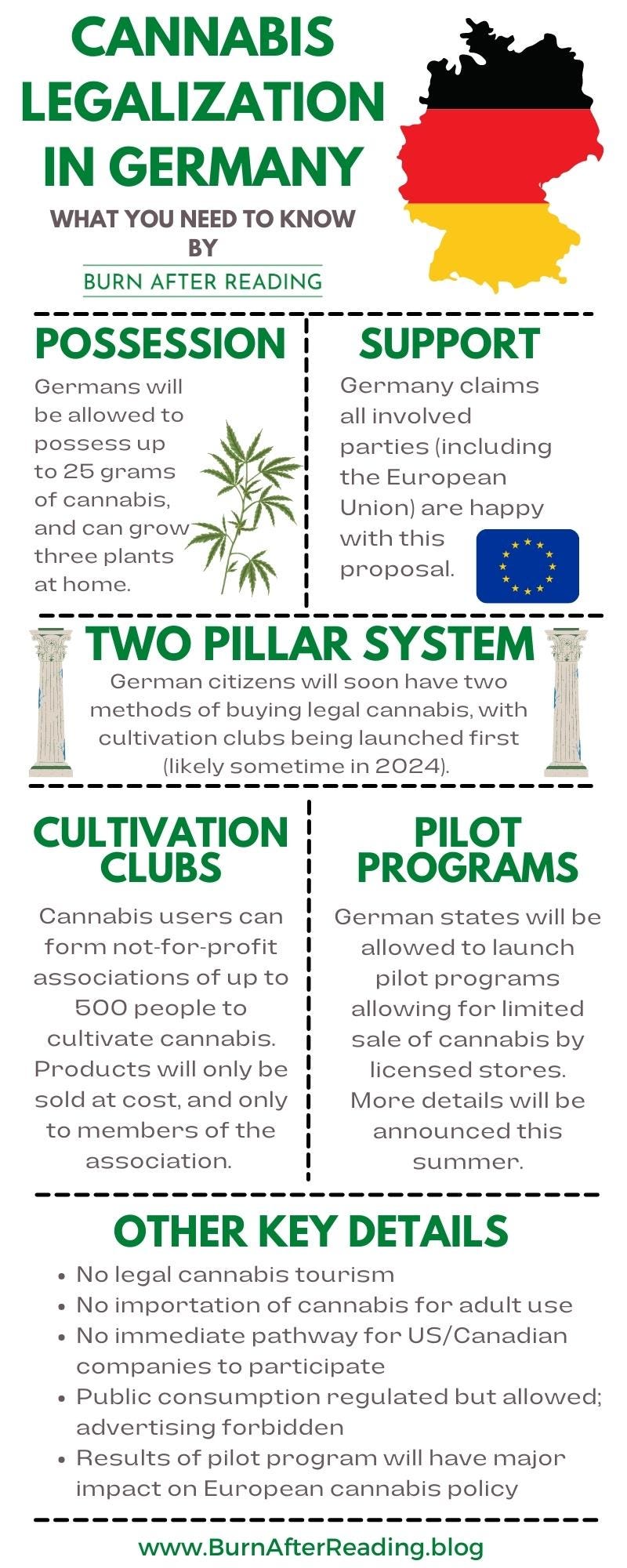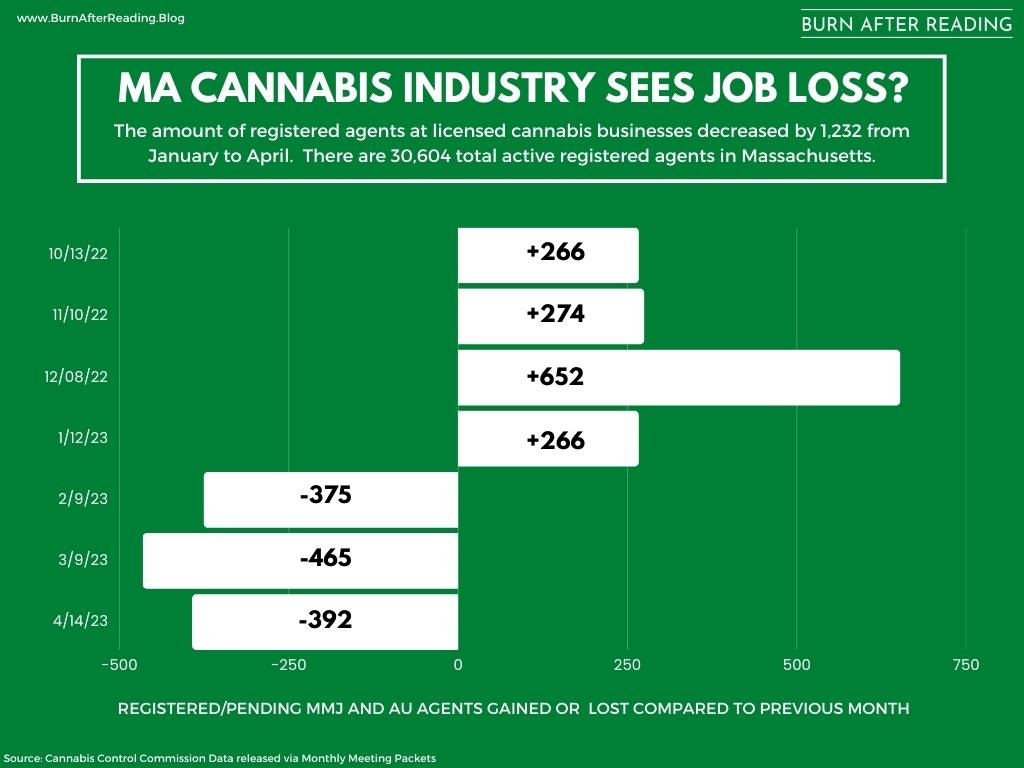Issue 41: Germany Sinks The Big Cannabis Lifeboat
Germany's proposed legalization rules block out Big Cannabis from participating anytime soon. Plus: Cannabis job numbers decline, and Curaleaf is in hot water in NJ.
Welcome to Issue #41 of Burn After Reading! You can check out last week’s issue here. If you haven’t subscribed already, head here.
Germany Says ‘Nein’ to Allowing Big Cannabis To Sell Recreational Weed
When it became clear late last year that Congress was not going to take any meaningful action on cannabis reform, a few large cannabis companies — mainly Tilray and Curaleaf — decided to pivot to presenting Germany’s upcoming legalization program as the next big thing.
Now that the country has finally announced its legalization plans this week, a problem in this strategy has emerged: Germany seems to have little interest in letting these companies participate in its adult use market any time soon.
The German Plan
Before we get into that aspect of the story, let’s take a look at what Germany actually announced this week. It’s easy to portray this as “scaled back” legalization (as many have), but it’s important to remember what hasn’t been lost. Possession will still be decriminalized, harm reduction will be empathized over criminal penalties, and Germans will have multiple pathways to obtain legal cannabis.
Here’s a breakdown of some of the key components of Wednesday’s announcement
The German government made it clear from the get-go that multinational cannabis companies weren’t going to dictate how they went about legalization. When Tilray attempted to portray a quick one-time conversation with regulatory officials in September as a “policy roundtable” in a press release last September, the Germans quickly noted that no such meeting had occurred, telling MJBizDaily at the time:
“The content of the press release is just not correct. We are not downplaying the meeting, because there is no cooperation and there will be none either with Tilray. On no level to be clear.”
Despite this very public rejection, Both Tilray and Curaleaf have spent the past few months hyping themselves as the leading North American cannabis companies with a footprint in Europe, but their reaction to Wednesday’s news was a lot more muted. Curaleaf had nothing to say about Germany on social media, and Tilray released a terse statement saying that they “look forward to providing Germany with adult use cannabis of the utmost quality when the time comes.” By my calculations, that time will come sometime between 2025 and never.
Tilray also responded to the news by attempting to turn attention back to their footprint in Germany’s existing medical cannabis industry, but I think it’s possible that today’s news is going to have a negative impact on that program as well. While the country’s existing medical cannabis industry will not directly be impacted by the launch of adult use, it’s possible that some patients will eventually abandon the bureaucratic process of obtaining medical cannabis if they can meet their own needs through homegrows, or through participating in one of the not-for-profit cultivation associations.
How This News Impacts America
Companies having existing medical cannabis facilities and infrastructure in Europe is no guarantee they’ll eventually be allowed full access to sell in future adult use markets there. North American cannabis companies who are making big bets on Europe are playing a risky game in an already dangerous economic environment.
While Germany is still hoping that other EU countries will follow suit in reforming their cannabis policies, it’s clear that the legalization floodgates in Europe won’t be opening soon enough to save existing North American cannabis companies from their current financial struggles. Even when legalization does finally take over the E.U, it seems that there’s more will to try a different model than the commercialized versions we’ve seen in Canada and the United States.
It’s clear that governments who want to end cannabis prohibition now have a litany of options at their disposal. The false choice between fully commercial legalization and prohibition has been shattered, and it’s clear there are other ways to legalize that seem to prioritize public health and the rights of consumers over the profits for private corporations.
While we have yet to see any American states experiment with the models of legalization that we’re seeing countries like Germany, Switzerland, and Malta try, it seems like these types of regulatory schemes would be perfect for states who are concerned about the commercial impacts of legalization getting out of hand.
Germany’s approach may come off as overly cautious to some, and there’s still a lot to be determined in terms how full legalization will eventually be enacted. It also remains possible that North American companies may eventually have some level of access to Germany’s adult use market, and I’m sure all sorts of MSO lobbyists will be descending on the Bundestag this summer to try to pry open that door. Still, Germany’s “scaled back” legalization has the potential to change the cannabis landscape as we know it.
Cannabis Jobs Decline in 2022
Back here in the United States, a new report released this week suggests that cannabis job numbers declined by 2% in 2022. The 2023 Vangst Job Report claims that after over a decade of double digit growth, the industry saw its first ever drop in employment. Although the study’s author seem to believe that this decline is mostly temporary, it’s clear that the days of unstoppable growth in the cannabis space are mostly behind us.
While I appreciate that I’m not the only one keeping track of jobs numbers in the cannabis space, I do find the prediction of 12% growth in 2023 to be a bit optimistic.
It’s true we’re seeing accelerating job growth in New York and other markets, but I’m not sure that’s going to be enough to offset declines elsewhere. And while the increased unionization of the industry is a promising sign, it doesn’t seem to be doing a lot to prevent layoffs, even in markets that have yet to reach full saturation.
(I will gladly eat crow next year if I happen to be wrong, and I do want to point out that I appreciate the amount of detail and thought that went into this study, even if I’m somewhat skeptical of some of its conclusions.)
Previous versions of job report were hosted by Leafly, but after that company’s recent announcement that they are exiting the journalism space, this year’s version has been made possible with a partnership with Vangst.
Even Vangst itself has been impacted by the downturn in the cannabis market; the cannabis-focused staffing company cut nine jobs back in December.
Here in Massachusetts, fresh data suggests that our job decline also continues unabated. Data released ahead of today’s CCC meeting shows that the amount of total active and pending registered agents in the state decreased by 392 from March to April, the third straight month of decline.
New Jersey Declines to Renew Curaleaf’s Adult Use Licenses. Will This Have Implications Elsewhere?
Speaking of layoffs, it seems like Curaleaf is in some hot water in New Jersey for how they handled recent reductions. As first reported by fellow cannabis substacker Jeremy Berke on social media, the motion to approve the renewal of Curaleaf’s five adult use licenses at last night’s New Jersey Cannabis Regulation Commission failed 2-1, with 2 commissioners abstaining.
A few different issues were brought up by the Commissioners before the vote, but the main concern seems to be that the company may have violated state statutes by not properly reporting recent layoffs and closures to the Commission.
(You can see the discussion and vote here.)
It seems that New Jersey’s Commissioners weren’t willing to give the benefit of the doubt to a company that has a fairly established track record of regulatory violations across the country. Of course, Curaleaf will likely use all potential avenues of appeals in an attempt to overturn this decision, so this is probably not the last we’ve heard of this story.
It’s worth noting that Massachusetts regulations require the state’s Commissioners to consider violations and “substandard levels of compliance” in other jurisdictions when making a decision to approve an application or renewal. This is particularly bad timing for Curaleaf, because they happen to have a license up for renewal at this CCC meeting that will be held this very morning. Hmm…
Update: Curaleaf released a statement about the denial of their New Jersey license renewal applications, calling the move “an outrageous act of political retaliation for our need to consolidate production into one facility.”
The statement also declares the company to be “in good standing with the CRC.” (I feel obligated to point out that it’s not typically up to a company to decide if they are or aren’t in good standing with regulators).
Some Housekeeping Notes
Despite not fully understanding what Substack Notes is, I’m on Substack Notes now. There, you’ll find content that I used to post on twitter (or whatever Elon is calling it today). You should be able to access Notes via Substack.com or the Substack app.
I’m launching a weekly column for paid subscribers called Unsolicited Advice. I gave all my subscribers a peek at the first one. You can upgrade to a paid subscription here.
I’m also ready to announce that I’m officially looking for a sponsor for this newsletter. I’m still working on the details, but I would prefer it to be a non-plant touching business or organization. This should be obvious, but sponsors won’t have any editorial control, and I’ll be sure to make it clear to readers on what terms I’m agreeing to if/when I do take a sponsor on. All paid content will also remain ad-free. If your business or org is interested in this opportunity, reach out.
Headlines
New England
BLAZEXPRESS IN HOLYOKE OPENS MARIJUANA DELIVERY SERVICE (Kiara Smith | WWLP News): “Holyoke Mayor Joshua Garcia along with the Greater Holyoke Chamber attended the ribbon-cutting ceremony on Wednesday and stated BlazeXpress is Holyoke and western Massachusetts’ first cannabis home delivery institution.”
CONNECTICUT MARIJUANA SALES REACHED RECORD $22 MILLION IN MARCH AS ADULT-USE MARKET MATURES (Kyle Jaeger | Marijuana Moment): “March marked the third month since adult-use cannabis sales launched in the state, and there’s been a familiar upward trend in these early months of the rollout. Medical marijuana purchases are still outpacing recreational sales, with the more established patient market bringing in about $12.6 million and the newer industry seeing $9.6 million in cannabis commerce for the month.”
Rest of U.S. / National
GREEN THUMB DEAL TO SELL MEDICAL MARIJUANA AT FLORIDA GAS STATIONS ON HOLD AMID LITIGATION (Chris Casacchia | MJBizDaily): “At the time, GTI founder and CEO Ben Kovler called the deal “a game-changer,” adding: “Convenience is a strong channel in retail, and people want more access to cannabis.” Shortly after the October announcement, however, MJBizDaily confirmed the state’s medical cannabis regulator hadn’t signed off on the deal – a position that has remained unchanged since then.” [Editor’s Note: You may remember a few months ago, when I explained to readers why the “medical dispensary inside a gas station” concept was unlikely to take off in Florida any time soon.]
LAWSUIT ONGOING BETWEEN ALABAMA MEDICAL CANNABIS COMMISSION, POTENTIAL BUSINESSES (WSFA News): “According to the court documents, the suits for each company revolve around file-size limits in the application submission portal. The commission had to notify the two companies about their application deficiencies by Monday evening.”
MARIJUANA EQUITY ADVOCATES RELEASE ‘ANTI-MONOPOLY TOOLKIT’ TO SHAPE LEGALIZATION LAWS (Kyle Jaeger | Marijuana Moment): “The Parabola Center for Law and Policy, a nonprofit focused on advancing equity-centered reform, is rolling out the “Anti-Monopoly Toolkit,” which provides an overview of state and federal policy priorities to prevent corporatization and consolidation that could threaten small cannabis businesses in the industry.”
BRITTNEY GRINER WORKING ON MEMOIR ABOUT RUSSIAN CAPTIVITY (Hillel Italie | AP): “Russia has been a popular playing destination for top WNBA athletes in the offseason, with some earning salaries over $1 million — nearly quadruple what they can make as a base WNBA salary. Despite pleading guilty to possessing canisters with cannabis oil, a result of what she said was hasty packing, Griner still faced trial under Russian law.”
International
🇹🇭 THAILAND’S CANNABIS CHAMPION EYES BIGGER ROLE FOLLOWING MAY ELECTION (Panarat Thepgumpanat and Panu Wongcha-um | Reuters): “Thailand's health minister who championed the legalisation of cannabis is hoping the reform will help deliver gains in next month's election, with expectations he could emerge as a power broker who can stitch together a coalition government. Anutin Charnvirakul, 56, is confident his Bhumjaithai Party will be part of the next government after an election that is shaping up to be a tight contest between pro-military conservatives and their populist opponents.”
🇨🇦 ORGANIGRAM CEO WARNS OF UNSUSTAINABLY CHEAP CANNABIS, REPORTS CA$7.5M QUARTERLY LOSS (Solomon Israel | MJBizDaily): “Later in the call, Goldenberg said Organigram would continue competing in the large-format flower segment, “but we just won’t compete at the very low prices, it’s just not sustainable.” The cannabis executive’s comments came as Organigram reported a net loss of CA$7.5 million for the quarter ended Feb. 28, as net revenue grew 24% from the same quarter last year to CA$39.5 million.”
Welcome Distraction
It’s that time of the year again…Eurovision is back! While I didn’t find this year’s field to be as strong as last year’s entries, you can check them all out here. I’m partial to Austria’s entry, but I think Ukraine has a solid shot to repeat.
Cat of the Week
This little guy down in Swansea, MA who managed to get his head caught in a storm grate (luckily, he’s okay and back at home).
That’s a wrap on this issue. Thanks for reading! If you have any suggestions or feedback, let me know by replying to this email. Be sure to subscribe if you haven’t already, and if you can afford to support my work, please consider a paid subscription.






